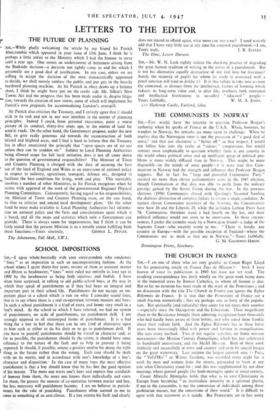LETTERS TO THE EDITOR
THE FUTURE OF PLANNING
• Sia,—While gladly welcoming the article by my friend Sir Patrick Abercrombie which appeared in your issue of 13th June, I think he is perhaps a little unfair to the Ministry which I had the honour to serve until a year ago. One senses an undercurrent of bitterness arising from the Bankside decision—a decision not lightly come to and for which I personally see a good deal of justification. In any case, unless we are willing to accept the decision of the men democratically appointed to decide, we shall merely confuse the public and put grit in the heavily burdened planning machine. As Sir Patrick in effect draws up a balance sheet, I think he might have put on the credit side Mr. Silkin's New Towns Act and the progress that has been made under it, despite tion, towards the creation of new towns, some of which will implement Sir Patrick's own proposals for accommodating London's overspill.
Sir Patrick also criticises the Treasury, and I entirely agree that it should stick to its task and not in any way interfere in the matter of planning principles_ Indeed I could, from personal experience, paint a worse picture of its conduct, thirty-five years ago, in the matter of land for arterial roads. On the other hand, the Government propose, under the new Bill, to give really generous aid towards the reconstruction of both blitzed and blighted areas, and I find it hard to believe that the Treasury has in effect enunciated the principle that " open •spaces are of no use unless they can be trodden on." Subject to Local Planning Authorities being allowed scope for full local initiative, does it not all come down to the question of governmental responsibility? The Minister of Town and Country Planning is charged with the duty of securing the best
4 use of the land of England and Wales as an expression of national policy in respect to industry, agriculture, transport, defence etc., designed to facilitate the best conditions for living, work and play. This inevitably involves a number of other Ministries, as Sir Patrick recognises when he writes with approval of the work of the governmental Regional Physical Planning Committees. Consequently, having regard to his responsibilities, the Minister of Town and Country Planning must, on the one hand, be free •to criticise and amend local development plans. On the other hand he must make available to Local Planning Authorities full informa- tion on national policy and the facts and considerations upon which it is based, and all the maps and statistics which only a Government can provide. There is always room for improvement, but I think it can be fairly stated that the present Minister is to a notable extent fulfilling both
The Athenaeum, Pall Mall, S.W.I.






































 Previous page
Previous page